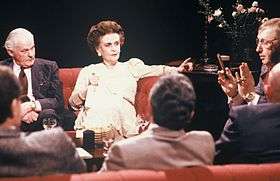Cecil Blacker
General Sir Cecil Hugh Blacker GCB, OBE, MC (4 June 1916 – 18 October 2002) was a senior British Army officer and a former Adjutant-General to the Forces.
Sir Cecil Blacker | |
|---|---|
 Appearing (left) on television discussion programme After Dark in 1988 | |
| Born | 4 June 1916 York, United Kingdom |
| Died | 18 October 2002 (aged 86) |
| Allegiance | |
| Service/ | |
| Years of service | 1936–1976 |
| Rank | General |
| Commands held | 23rd Hussars 5th Royal Inniskilling Dragoon Guards 39th Infantry Brigade Group 3rd Division Northern Command |
| Battles/wars | Second World War |
| Awards | Knight Grand Cross of the Order of the Bath Officer of the Order of the British Empire Military Cross |
Military career
Educated at Wellington College and at the Royal Military College, Sandhurst, Cecil Blacker was commissioned into the 5th Royal Inniskilling Dragoon Guards in 1936.[1] He was adjutant of the Regiment during the Dunkirk evacuation in 1940.[2] He later transferred to the 23rd Hussars which then formed part of 11th Armoured Division.[2] He was awarded the Military Cross in 1944 following Operation Goodwood[2] and went on to become Commanding Officer of the 23rd Hussars in 1945.[2]
Blacker commanded the 5th Royal Inniskilling Dragoon Guards from 1955 to 1957. He was then Military Assistant to the Chief of the Imperial General Staff, Field Marshal Sir Gerald Templer from 1958 to 1960.[2] He was appointed Commander of 39th Infantry Brigade in Northern Ireland in 1962 and was then General Officer Commanding 3rd Division from 1964 to 1966.[2]
He was appointed General Officer Commanding-in-Chief Northern Command in 1969[1] and then went on to become Vice Chief of the General Staff in 1970[1] before becoming Adjutant General in 1973:[1] he held this post until he retired in 1976.[1] In 1974 his home was badly damaged by an IRA bomb[3]
He was ADC General to the Queen from 1974 to 1976.[1] He was also Colonel of the 5th Royal Inniskilling Dragoon Guards from 1972 to 1981.[4]
Blacker was appointed a Companion of the Order of the Bath in 1967, a Knight Commander of the Order of the Bath in 1969 and a Knight Grand Cross of the Order of the Bath in 1975.[1] He was also appointed an Officer of the Order of the British Empire in 1960.[1]
He lived in Hook Norton near Banbury in Oxfordshire.
Showjumping
Blacker was an Amateur Steeplechaser and International Showjumper. He rode in the 1948 Grand National. He rode Pointsman to win the Grand Military Gold Cup at Cheltenham in 1954.[2] He represented Great Britain in Showjumping from 1959 to 1961.[2] He was President both of the British Showjumping Association from 1976 to 1980 and of the British Equestrian Federation from 1980 to 1984.[1] He was a member of the Horse Race Betting Levy Board from 1980 to 1983.[1]
Family
In 1947 he married Felicity Mary Rew and together they went on to have two sons, writer Terence Blacker and sculptor and former jockey Philip Blacker.[2]
References
- Debrett's People of Today 1994
- Obituary: General Sir Cecil Blacker The Times, 23 October 2002
- Crime in Britain Today
- "5th Royal Inniskilling Dragoon Guards". Regiments.org. Archived from the original on 27 February 2007. Retrieved 6 August 2016.CS1 maint: BOT: original-url status unknown (link)
| Military offices | ||
|---|---|---|
| Preceded by Michael Carver |
General Officer Commanding the 3rd Division 1964–1966 |
Succeeded by Anthony Deane-Drummond |
| Preceded by Sir Walter Walker |
GOC-in-C Northern Command 1969–1970 |
Succeeded by Sir William Jackson |
| Preceded by Sir Victor FitzGeorge-Balfour |
Vice Chief of the General Staff 1970–1973 |
Succeeded by Sir David Fraser |
| Preceded by Sir John Mogg |
Adjutant General 1973–1976 |
Succeeded by Sir Jack Harman |